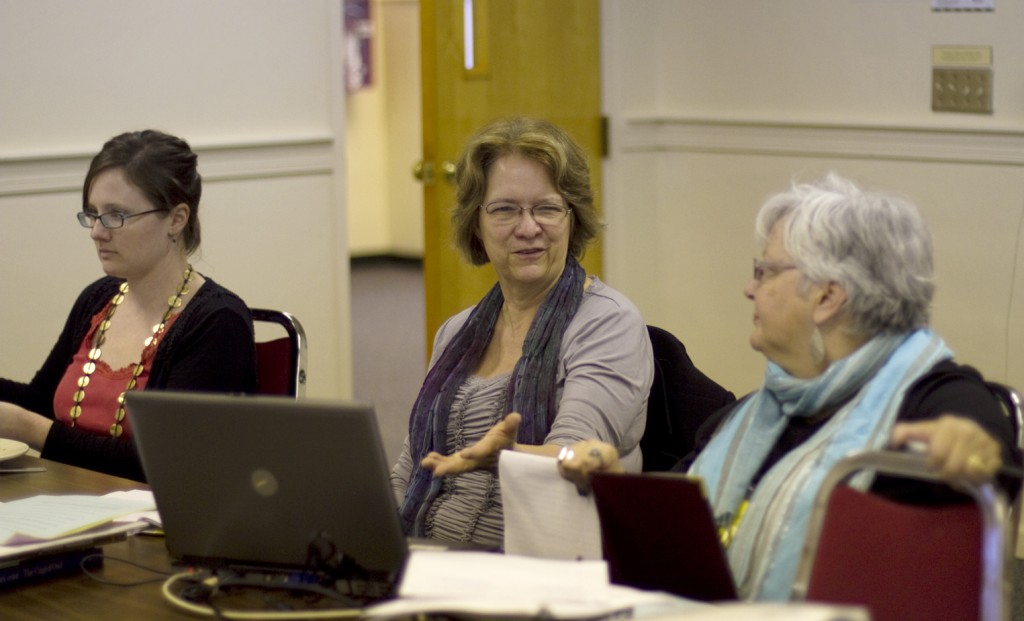Traveling almost 4,000 miles from their home in Alberta, Canada, acclaimed Canadian writer Rudy Wiebe and his wife Tena joined 170 other writers and fans of the written word at a bi-national conference on Mennonite writing held at Eastern Mennonite University (EMU) March 29 to April 1, 2012. (Photos are online at emu.edu/photos/mennonites-writing-vi-conference/)
Speaking at the final event, a service marking Palm Sunday, Wiebe touched on the way writers work in silence, enveloped in the mystery of writing. Yet when writers and readers meet, their “mutual silences open to listening.”
There was little silence at this conference, dubbed “Mennonite/s Writing VI.” Packed into the two days, one evening and one morning were: an oratorio featuring the poetry of one of the conference participants, Jean Janzen of California; two dramatic performances and an equal number of music events; at least 30 readings from original poems, works of fiction and memoirs; and plenty of talks on such weighty topics as the intersection of theology and poetry (“theopoetics”), on teaching writing and literature, and on what it means to be a Mennonite or to write in a Mennonite manner. Critics of literature formed one panel discussion and publishers of literature formed another.
Some participants left the campus to take a guided tour of the MennoMedia offices a block away or a different tour to Singers Glen, eight miles to the west of EMU, where the oldest continually used hymnal in the United States was first published by a local Mennonite man, Joseph Funk.
Kirsten Beachy, an EMU assistant professor who was co-chair of the conference, smilingly summed up the conference with these words: “We feasted together on words and on food.”
Throughout the conference, participants often credited Wiebe and Julia Spicher Kasdorf, a poet and conference co-chair, with inspiring other Mennonite writers by producing seminal works that challenged the insularity of the traditional Mennonite church-community in North America—he in 1962 with his first novel, Peace Shall Destroy Many, and she in 1992 with her first book of poetry, Sleeping Preacher.
Well-known poet and essayist Gregory Orr, a University of Virginia professor who is not a Mennonite, attracted one of the largest crowds assembled in one location to hear his talk on “ethics, aesthetics and the lyric.” He advocated that writers be true to themselves and “break with the overculture,” a message that resonated with his Mennonite audience in two ways—some have worked hard to find their voice within the “overculture” of their original community, while many view themselves as belonging to a minority culture that often goes against the grain of the mainstream culture.
On Friday evening, Vern Thiessen, one of the most-produced playwrights in Canada, performed two roles—that of himself and of his father—in “Back to Berlin,” his play exploring how his father (and by extension other Mennonites in Germany) acquiesced to or collaborated with the Nazis during World War II.
Writers who received formal tributes at the Saturday evening banquet were Ervin Beck, Goshen College professor emeritus; Omar Eby, EMU professor emeritus; Al Reimer, professor emeritus at the University of Winnipeg; Elaine Sommers Rich, author of the 1964 children’s book Hannah Elizabeth; and Katie Funk Wiebe, a prolific essayist who taught at Tabor College before her retirement.
The EMU conference received support from the Virginia Commission for the Arts and the National Endowment for the Arts, as well as from Conrad Grebel University College in Ontario and private donors. It was the sixth gathering in North America since 1990 of writers who have a Mennonite background, who delve into Mennonite themes in their works, or who simply have an interest in this field. Photos are online at emu.edu/photos/mennonites-writing-vi-conference/

Discussion on “170 North American Writers Gather at EMU”
Comments are closed.